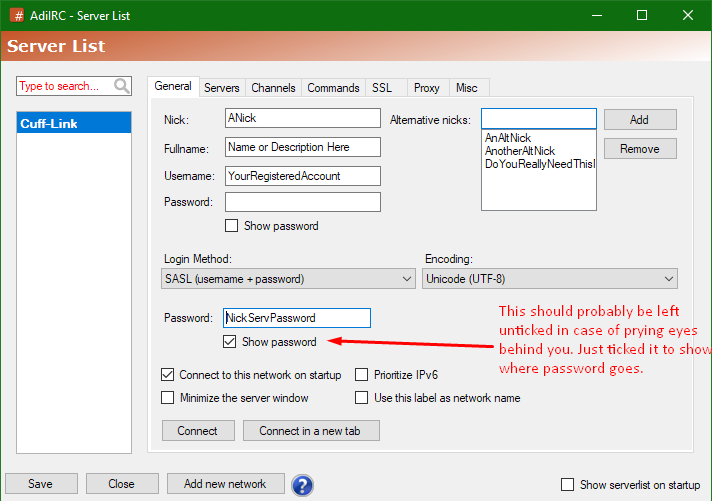

In fact, depending on the number of users in the channel and how active they are, discussions can be challenging to piece together. The discussion is typically free-form so don't expect to go into a threaded UX with everything tightly organized or hierarchical. By joining a channel, you're choosing to jump into a discussion group about a specific topic. I referenced the termm "channels" before just as when you're watching TV, specific networks have specific channels for specific topics. It's the network I'll be focusing on in this article. Wikipedia lists it as the largest of the major networks, with approximately 85k users on it at peak hours.
#LIMECHAT CHANGE NICKNAME SOFTWARE#
"An IRC network providing discussion facilities for the Free and Open Source Software communities, not-for-profit organizations, and related communities."Īnd with open source software so vitally important today to just about every major web property, it makes perfect sense why so many of the popular development channels are on Freenode. Here's how the Freenode network describes itself: There are also regional networks for different countries as well, but in terms of development, from my experience, most developers tend to jump on Freenode - and rightfully so. These are networks that average 10,000 or more users, and tend to have the largest, busiest channels. According to, the major networks are as follows: For example, Aniverse is geared toward the Anime crowd, while QuakeNet targets video game players - especially Quakeworld players. There are a number of networks out there, and most are targeted to specific interests.

The networks are just machines that are setup to allow users to connect to IRC. IRC works by using some type of client that connects you to an IRC network. The first thing that you need to understand is the lay of the land.

So let's first break down how things work. That's actually a good thing because to be honest, a LOT of great discussions are happening on there and in some cases, going to a channel is the only way to get any decent support, especially for some open source efforts. So you want to get into this "IRC thing".

I'm also going to say (and I'm sure I'll get some grief for it) that I think there's a little bit of "geek cred" action going on here when you can tell someone, "let's chat about it on IRC". While there have been group-based services for a while no (Skype, Campfire, Google Hangouts, etc.), the relatively open nature of IRC makes it easy for large groups of people to hop on a channel and collaborate easily. What I've noticed in the last couple of years is a resurgence in using IRC as a primary means of communication, especially for open source projects. Having been on the Internet for some time now (I used to dial-in with a 2400 baud modem), I remember using IRC, but gravitated to many of the services that I mentioned earlier, because they just seemed more user-friendly and feature-rich. The channels served to identify different discussion topics you could pop in on. IRC (Internet Relay Chat) is a protocol, created in 1988, and was meant to help facilitate group discussions, via various channels. What I've noticed in the last couple of years is a resurgence in using IRC as a primary means of communication. Interestingly enough, all of the services that I noted above, while awesome in their own way, have taken a backseat to another medium for developers: IRC. In the ever-growing world of remote teams and worldwide collaboration on projects, the ability to get good, immediate feedback is critical to solving problems. The main thing is that they were meant to facilitate communication. Some of you may be too young to even know about those services, but I'll go out on a limb and assume that everyone's used either AOL Instant Messenger, Skype, or Yahoo! Messenger at some point. In many cases, they offered complementary services, such as forums or classified services, not to mention a pretty appealing user interface (for the time). How of many of you remember Compuserve? What about Prodigy? I'm asking because, back in the good 'ole days, they were popular services that allowed you to communicate with other people from all over the world.


 0 kommentar(er)
0 kommentar(er)
